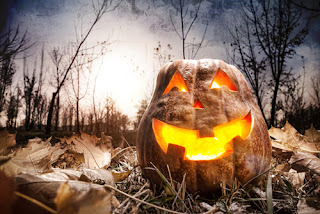 We can thank Irish immigrants for bringing us the tradition
of having a Jack O’Lantern on All Hallow’s Eve. The practice dates back to
ancient Celtic cultures when they carved scary faces onto turnips and potatoes.
Once carved, the root vegetables were hollowed out and put on a windowsill with
an ember placed inside – all this was done to ward off Stingy Jack and other evil
spirits while guiding the good spirits to them.
We can thank Irish immigrants for bringing us the tradition
of having a Jack O’Lantern on All Hallow’s Eve. The practice dates back to
ancient Celtic cultures when they carved scary faces onto turnips and potatoes.
Once carved, the root vegetables were hollowed out and put on a windowsill with
an ember placed inside – all this was done to ward off Stingy Jack and other evil
spirits while guiding the good spirits to them.
The Legend of Stingy
Jack
Stingy Jack was an Irish farmer who made a deal with the
devil. A miserable old drunk, he reveled in playing mean-spirited tricks on
anyone. On All Hallow’s Eve, he ran into the devil at a local pub. Jack tricked
the devil by offering his soul in exchange for one last drink. The devil turned
himself into a 6-pence to pay the tab but Jack snatched the coin and pocketed
it with his silver cross. This rendered the devil unable to change back. Jack made
a deal, he would only set the devil free if he promised not to claim Jack’s
soul for 10 years.
Ten years on, Jack came across the devil while walking on a
country road. The devil wanted to collect his due. But Jack, ever the conniving
sot, replied, “I’ll go but before I do, will you get me an apple from that
tree?”
The devil jumped up into the tree to retrieve an apple. Jack
quickly placed silver crosses around the trunk of the tree. Once again, the
crosses trapped the devil. This time, Jack only released the devil when he
promised not to take his soul until he died from natural causes.
The devil had
no choice but to agree.
When Stingy Jack passed away, he was refused admission to
the Gates of Heaven because he'd spent his stingy, tight-fisted life as a
deceitful drunk. So, Jack was relegated to trying to enter hell. But the devil
would not let him enter and sent him back to where he came from.
The way back was windy, scary and perpetually dark. Stingy
Jack pleaded with the devil to give him a way to light his path. The devil
tossed Jack and ember from the fires of Hell. Jack placed the ember in a
hollowed out turnip – his favorite food and one he could easily steal. Since
that time, Stingy Jack has been wandering the earth, without a resting place
and with only his turnip and ember to light his way in the darkness.
The practice of warding off spirits with carved out
vegetables spread beyond Ireland and Scotland to England, where they adopted
the practice using beets. When the immigrants arrived in the United States,
they found a plentiful supply of pumpkins and, although still somewhat messy,
they provided a cleaner and more convenient vessel for the carving and for embers.
As a child, I remember that the night my dad carved our pumpkin was a big event. Much planning went into the plan for the face and the expression that would work best. Putting that pumpkin out on the porch with a lit candle seemed to signal the beginning of all of the light and food-filled celebrations that we had to look forward to in the coming months. It was both the end of summer and the beginning of celebrating the new and incoming possibilities of the high holidays.
Submitted by Deb N.







Very cool story! Gets me in the mood for Halloween.
ReplyDelete